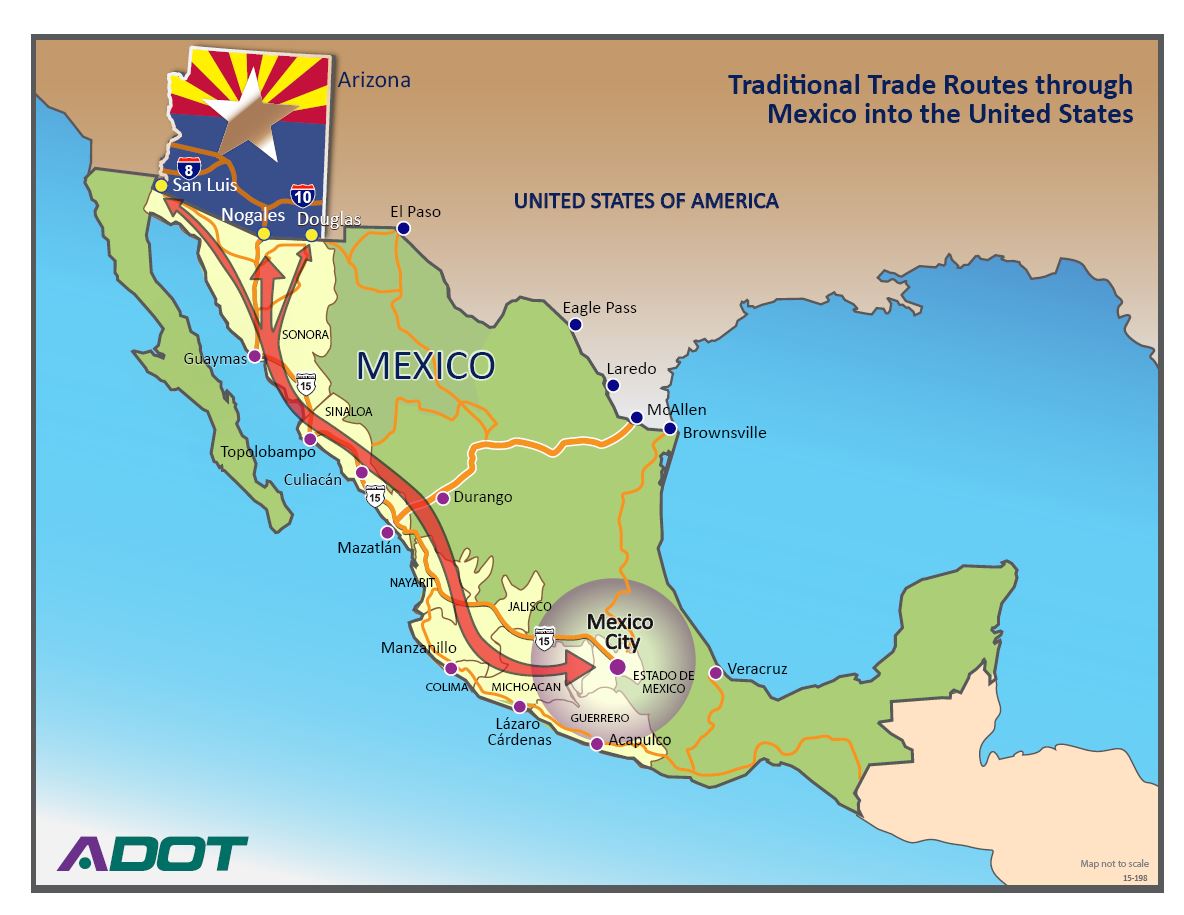Arizona, Mexico sign agreement to further develop binational trade corridor
Arizona, Mexico sign agreement to further develop binational trade corridor
PHOENIX – Arizona and Mexico will further their collaboration on developing the key trade corridor connecting them under an agreement signed this week by Arizona Department of Transportation Director John Halikowski and Raul Murrieta Cummings, undersecretary of infrastructure for Mexico’s Ministry of Communications and Transport.
The memorandum of understanding, signed Tuesday in Mexico City, establishes a joint planning committee that will produce a study of ways to improve the corridor along Interstate 19 in Arizona and Highway 15 in Mexico. The primary north-south route in western Mexico and the western United States, the corridor feeds into Arizona’s port of entry system along with Arizona’s and Mexico’s highway systems.
The Arizona portion of the corridor will also serve as part of the anticipated route of Interstate 11, a multimodal transportation corridor from Nogales to the Hoover Dam bypass bridge. From there, I-11 will expand into northern Nevada, potentially reaching as far as Canada.
“Our efforts to strengthen the Arizona-Mexico relationship are already resulting in great success, including the signing of this agreement between ADOT and the Mexican federal Ministry of Communications and Transport,” Governor Doug Ducey said. “These efforts will grow our binational trade and make our freight and trade corridor one of the most competitive in the global market.”
Mexico is Arizona’s largest international trading partner, with $16 billion annually in imports and exports. By working together to invest in transportation infrastructure on both sides of the border, Arizona and Mexico will realize opportunities for connectivity, economic development and job growth.
“This is the culmination of years of building the right relationships and a continuation of Governor Ducey’s commitment to fostering a closer working relationship with Mexico,” Halikowski said. “Governor Ducey has challenged us to think big, to think as a business, and with this study we will push our sphere of influence beyond the border, helping Arizona companies tap into new business opportunities in Mexico. This will also help us position our corridor as a viable, cost-effective alternative to the corridors connecting Mexico to the Texas border.”

Mexico has pledged $100,000 and ADOT $200,000 toward the first phase of the multiyear Arizona-Mexico Corridor Study, which will identify priority transportation projects, solutions to congestion and backups along the Arizona-Mexico border, ideas to make the corridor more efficient for multimodal transportation, and technologies to improve efficiency and reliability. The study will also focus on identifying clusters for job creation and economic development along the entire corridor.
“This one-of-a-kind study will set us apart from the rest and help us market our region throughout the world,” Halikowski said.
ADOT is a member of the Transportation and Trade Corridor Alliance, which includes the Arizona-Mexico Commission, the Arizona Commerce Authority and the Arizona Office of Tourism, along with other partner agencies. The alliance focuses on creating economic development opportunities for Arizona and Mexico through investment in transportation infrastructure, partnerships and strategic planning.
“The Arizona-Mexico Corridor Study promises to bring greater understanding of the economic opportunities that exist for our region,” said David Farca, president of the Arizona-Mexico Commission. “In addition, it will help us raise awareness of Arizona’s strategic geographic position in the heart of an economically powerful mega-region that gives us a competitive advantage in the global market and makes Arizona a prime location to do business.”
Over the last few years, ADOT and the Federal Highway Administration, along with the U.S. General Services Administration and U.S. Customs and Border Protection, have invested more than $250 million in improvements at the Mariposa Port of Entry in Nogales ‒ improvements that benefit the overall corridor. Plans are moving forward to improve State Route 189 to enhance the flow of commercial truck traffic and to ensure international commerce can efficiently and safely travel between Arizona and Mexico.
During the meeting preceding the signing ceremony, Halikowski pushed for additional improvements to the Mexican side of Arizona’s ports of entry. Mexico’s Ministry of Communications and Transport reaffirmed its commitment of $2.2 billion for improvements to the Highway 15 corridor from Mexico City to the Arizona-Mexico border.
This week’s agreement promises to add not only needed infrastructure, but global opportunities.
“Arizona’s relationship with Mexico continues to grow and strengthen thanks to Governor Ducey’s efforts and ambitious trade agenda,” said Sandra Watson, president and CEO of the Arizona Commerce Authority. “In 2015 alone, Mexico accounted for more than $9 billion in Arizona exports. Conducting this study is an excellent step in enhancing the competitiveness of the Arizona-Mexico Corridor. Doing so will facilitate increased cross-border trade and advance Arizona’s position in the global economy.”
The Arizona-Mexico Corridor Study is expected to begin later this year.
